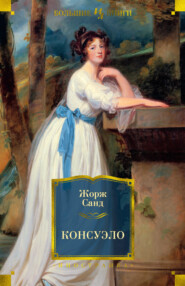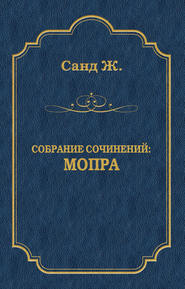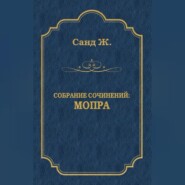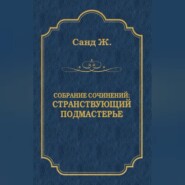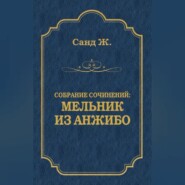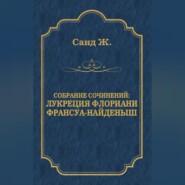По всем вопросам обращайтесь на: info@litportal.ru
(©) 2003-2024.
✖
The George Sand-Gustave Flaubert Letters
Настройки чтения
Размер шрифта
Высота строк
Поля
"One evening, expected by Hortense,
Having his eyes fixed on the clock,
And feeling his heart beat with eager throbs,
Young Alfred dried up with impatience."
(Memoires de l'Academie de Saint-Quentin.)
LXXII. TO GUSTAVE FLAUBERT
Nohant, 5 December, 1867
Your old troubadour is no good, I admit it. He has been working like an ox to have the money to go away with this winter to the gulf of Juan, and at the moment of leaving he would like to stay behind. He is worried at leaving his children and the little Aurore, but he suffers with the cold, he fears anemia, and he thinks he is doing his duty in going to find a land which the snow does not render impracticable, and a sky under which one can breathe without having dagger-thrusts in one's lungs.
So you see.
He has thought of you, probably much more than you think of him; for he has stupid and easy work, and his thoughts run elsewhere very far from him, and from his task, when his hand is weary of writing. As for you, you work for truth, and you become absorbed, and you have not heard my spirit, which more than once has TAPPED at your study door to say to you: "It is I." Or else you have said: "It is a spirit tapping let him go to the devil!"
Aren't you coming to Paris? I am going there between the 15th and the 20th. I shall stay there only a few days, and then flee to Cannes. Will you be there? God grant it! On the whole I am pretty well; I am furious with you for not wanting to come to Nohant; I won't reproach you for I don't know how. I have scribbled a lot; my children are always good and kind to me in every sense of the word. Aurore is a love.
We have RAVED politically; now we try not to think of it any more and to have patience. We often speak of you and we love you. Your old troubadour especially who embraces you with all his heart, and begs to be remembered to your good mother.
G. Sand
LXXIII. TO GEORGE SAND
Wednesday night
Dear master, dear friend of the good God, "let us talk a little of Dozenval," let us roar at M. Thiers! Can a more triumphant imbecile, a more abject dabster, a more stercoraceous bourgeois be found! No, nothing can give the idea of the puking with which this old diplomatic idiot inspires me in piling up his stupidity on the dung- hill of bourgeoisie! Is it possible to treat philosophy, religion, peoples, liberty, the past and future, history, and natural history, everything and more yet, with an incoherence more inept and more childish! He seems to me as everlasting as mediocrity! He overwhelms me!
But the fine thing is the brave national guards whom he stuffed in 1848, who are beginning to applaud him again! What infinite madness! That proves that everything consists of temperament. Prostitutes, – like France, – always have a weakness for old buffoons.
Furthermore, I shall try in the third part of my novel (when I reach the reaction that followed the days of June) to insert a panegyric about him a propos of his book: De la propriete, and I hope that he will be pleased with me.
What form should one take to express occasionally one's opinion on the things of this world, without the risk of passing later for an imbecile? It is a tough problem. It seems to me that the best thing is simply to depict the things which exasperate one. To dissect is to take vengeance. Well! it is not he with whom I am angry, nor with the others but with OURS.
If they had paid more attention to the education of the SUPERIOR classes, delaying till later the agricultural meetings; in short, if the head had been put above the stomach, should we have been likely to be where we are now?
I have just read, this week, Buchez' Preface to his Histoire parlementaire. Many inanities which burden us today come from that among other things.
And now, it is not good of you to say that I do not think of "my old Troubadour"; of whom then, do I think? perhaps of my wretched book? but that is more difficult and less agreeable.
How long do you stay at Cannes?
After Cannes shan't you return to Paris? I shall be their towards the end of January.
In order to finish my book in the spring of 1869, I must not give myself a week of holiday; that is why I do not go to Nohant. It is always the story of the Amazons. In order to draw the bow better they crushed their breast. It is a fine method after all.
Adieu, dear master, write to me, won't you?
I embrace you tenderly.
LXXIV. TO GUSTAVE FLAUBERT, at Croisset
Nohant, 31 December, 1867
I don't agree with you at all that it is necessary to destroy the breast to draw a bow. I have quite a contrary belief which I follow, and I think that it is good for many others, probably for the majority. I have just developed my idea on that subject in a novel which has been sent to the Revue and will appear after About's. I think that the artist ought to live according to his nature as much as possible. To him who loves struggle, warfare; to him who loves women, love; to an old fellow like me who loves nature, travel and flowers, rocks, fine landscapes, children also, the family, all that stirs the emotions, that combats moral anemia.
I think that art always needs a palette overflowing with soft or striking colors according to the subject of the picture; the artist is an instrument on which everything ought to play before he plays on others; but all that is perhaps not applicable to a mind like yours which has acquired much and now has only to digest. I shall insist on one point only, that the physical being is necessary to the moral being and that I fear for you some day a deterioration of health which will force you to suspend your work and let it grow cold.
Well, you are coming to Paris the beginning of January and we shall see each other; for I shall not go until after the New Year. My children have made me promise to spend that day with them, and I could not resist, in spite of the great necessity of moving. They are so sweet! Maurice has an inexhaustible gaiety and invention. He has made for his marionette theatre, marvelous scenery, properties, and machinery and the plays which they give in that ravishing box are incredibly fantastic.
The last one was called 1870. One sees in it, Isidore with Antonelli commanding the brigands of Calabria, trying to regain his throne and to re-establish the papacy. Everything is in the future; at the end the widow Euphemia marries the Grand Turk, the only remaining sovereign. It is true that he is a former DEMOCRAT and is recognized as none other than the great tumbler Coquenbois when unmasked. These plays last till two o'clock in the morning and we are crazy on coming out of them. We sup till five o'clock. There is a performance twice a week, and the rest of the time they make the properties, and the play continues with the same characters, going through the most incredible adventures.
The public is composed of eight or ten young people, my three great nephews, and sons of my old friends. They get excited to the point of yelling. Aurore is not admitted; the plays are not suited to her age. As for me, I am so amused that I become exhausted. I am sure that you would be madly amused by it also; for there is a splendid fire and abandon in these improvisations; and the characters done by Maurice have the appearance of living beings, of a burlesque life that is real and impossible at the same time; it seems like a dream. That is how I have been living for the ten days that I have not been working.
Maurice gives me this recreation in my intervals of repose that coincide with his. He brings to it as much ardor and passion as to his science. He has a truly charming nature and one never gets bored with him. His wife is also charming, quite large just now, always moving, busying herself with everything, lying down on the sofa twenty times a day, getting up to run after her child, her cook, her husband, who demands a lot of things for his theatre, coming back to lie down again; crying out that she feels ill and bursting into shrieks of laughter at a fly that circles about; sewing layettes, reading the papers with fervor, reading novels which make her weep; weeping also at the marionettes when there is a little sentiment, for there is some of that too. In short a personality and a type: she sings ravishingly, she gets angry, she gets tender, she makes succulent dainties TO SURPRISE US WITH, and every day of our vacation there is a little fete which she organizes.
Little Aurore promises to be very sweet and calm, understanding in a marvelous manner what is said to her and YIELDING TO REASON at two years of age. It is very extraordinary and I have never seen it before. It would be disquieting if one did not feel a great serenity in that little brain.
But how I am gossiping with you! Does all this amuse you? I should like this chatty letter to substitute for one of those suppers of ours which I too regret, and which would be so good here with you, if you were not a stick-in-the-mud, who won't let yourself be dragged away to LIFE FOR LIFE'S SAKE. Ah! when one is on a vacation, how work, logic, reason seem strange CONTRASTS! One asks whether one can ever return to that ball and chain.
I tenderly embrace you, my dear old fellow, and Maurice thinks your letter so fine that he is going to put the phrases and words at once in the mouth of his first philosopher. He bids me embrace you for him.
Madame Juliette Lambert [Footnote: Afterwards, Madame Edmond Adam.] is really charming; you would like her a great deal, and then you have it 18 degrees above zero down there, and here we are in the snow. It is severe; moreover, I rarely go out, and my dog himself doesn't want to go out. He is not the least amazing member of society. When he is called Badinguet, he lies on the ground ashamed and despairing, and sulks all the evening.
LXXV. TO GEORGE SAND 1st January, 1868
It is unkind to sadden me with the recital of the amusements at Nohant, since I cannot share them. I need so much time to do so little that I have not a minute to lose (or gain), if I want to finish my dull old book by the summer of 1869.
I did not say it was necessary to suppress the heart, but to restrain it, alas! As for the regime that I follow which is contrary to the laws of hygiene, I did not begin yesterday. I am accustomed to it. I have, nevertheless, a fairly seasoned sense of fatigue, and it is time that my second part was finished, after which I shall go to Paris. That will be about the end of the month. You don't tell me when you return from Cannes.
My rage against M. Thiers is not yet calmed, on the contrary! It idealizes itself and increases.
LXXVI. TO GUSTAVE FLAUBERT
Nohant, 12 January, 1868
No, it is not silly to embrace each other on New Year's day: on the contrary, it is good and it is nice. I thank you for having thought of it and I kiss you on your beautiful big eyes. Maurice embraces you also. I am housed here by the snow and the cold, and my trip is postponed. We amuse ourselves madly at home so as to forget that we are prisoners, and I am prolonging my holidays in a ridiculous fashion. Not an iota of work from morning till night. What luck if you could say as much! – But what a fine winter, don't you think so? Isn't it lovely, the moonlight on the trees covered with snow? Do you look at that at night while you are working? – If you are going to Paris the end of the month, I shall still have a chance to meet you.
From far, or from near, dear old fellow, I think of you and I love you from the depth of my old heart which does not know the flight of years.
G. Sand
My love to your mother always. I imagine that she is in Rouen during this severe cold.
LXXVII. TO GUSTAVE FLAUBERT






